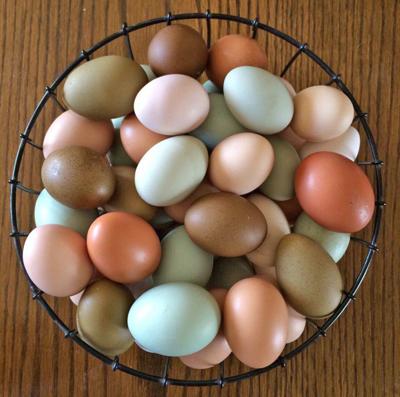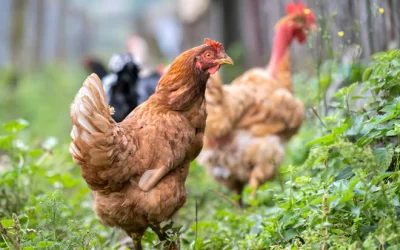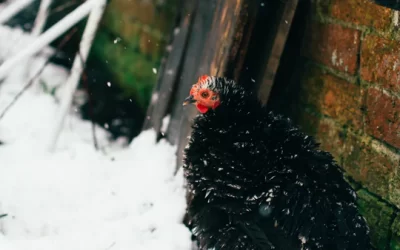If you are used to buying grocery store eggs in the US, you expect eggs to be white, clean, and refrigerated. When you start raising your own chickens, though, you will discover that what you are collecting in the nesting boxes is not quite what you find in the giant fridge at the local super center.
And that is a good thing!
Freshly-laid eggs are healthy, delicious, and anything but uniform. Depending on the breeds and ages of the birds in your flock, your eggs will vary in size and color—from white to shades of brown to blue and green. Freshly-laid eggs can go straight from the nesting box to your kitchen and into your hungry tummies.
But what if the eggs you collect are covered in…icky stuff? Read on for what you can do about dirty eggs.
Look at your coop
If you are finding a lot of dirty eggs in the nesting boxes, the cleanliness of your coop might be the culprit. Chickens do not exactly walk around muddy puddles or piles of dropping. They will walk straight through, getting muck all over their feet. Basically, whatever is on the ground is going to end up in their nesting boxes.
Keeping the floor of the coop clean goes a long way to having clean eggs. Take extra care to clean out your coop if the weather is wet and the ground is muddy. Do not waste time cleaning up when water gets into the food and makes a soggy mess. Try laying down sand or pine shavings to make sweeping out droppings and muck quick and easy.
Give them space
Make sure you have enough nesting boxes for your flock. If there are too many hens per box, they could try to lay at the same time and break the eggs already there. Having too many eggs in the same place could lead to breakage.
Aim for at least one nesting box for every 5 chickens, and fill the boxes with lots of soft, clean bedding to encourage laying and protect the eggs.
Collect regularly
Gathering your eggs often will prevent a backlog of breakable eggs (and also discourage other bad habits like egg eating) and protect the eggs from getting dirty later on when other birds climb in to take their turn laying.
Yuck Happens
Sometimes, despite your best efforts, eggs will get dirty. When it is clear that you need to clean an egg before you can eat it, follow these cleaning guidelines.
If it is not dirty, do not wash it
Eggs have a natural protective layer, called the bloom or the cuticle. This invisible layer protects the egg against bacteria and dirt. When it is removed by washing, it greatly reduces the shelf-life of the egg, even in the fridge. So unless you can see visible ickiness, skip the wash and pop the egg straight into the fridge in a carton, small side down.
Try dry-cleaning
No, we are not talking about the drive through that gives you the nifty hangers. Since eggshells are porous, water can cause bacteria to actually enter the eggs. Instead, use something slightly scratchy like fine sandpaper, an abrasive sponge, or a loofah. That way you can rub the yuck off without putting more yuck in.
Warm washing
If the dry rubbing does not work, you can use water if you follow the right steps. First, never use cold water—that will introduce the most bacteria. Instead use water warmer than the eggs (but not hot enough to cook them) and spray instead of dunk. Dry them with a clean towel.
Sanitize
If you are really concerned, or you are preparing eggs to sell, you can follow up the wet-washing with a sanitizing spray of bleach diluted in water. Spray the eggs and let them air dry. (If you are selling your eggs, check with your local health department about what cleaning is required by local law.)
Refrigerate
While some people think that unrefrigerated eggs taste better (and the egg’s bloom does keep it protected from bacteria), if you wash your eggs, they need to be refrigerated immediately after washing.
If in doubt, throw it out
If you come across an egg that is particularly gross, or just will not get clean, save yourself the worry and throw it out. There should be plenty more where that came from.
If you are vigilant about cleanliness and regular gathering, you will enjoy lots of delicious egg breakfasts (and more!) without the worry of dirty eggs. Stop by our shop for all the chicken supplies you need.
RELATED ARTICLES
Is my Chicken Sick? A Guide To Identifying Illness
Recognizing when your chickens are sick can sometimes be very difficult, primarily because they can hide it very well. As a chicken owner, it is vital to try to recognize early signs before it's too late. You may be wondering how can I tell if my chicken is sick?...
Preparing Your Flock For Winter
As winter approaches, you may wonder what you need to do to prepare your flock for winter and the best ways to care for them. Preparing Your Chicken CoopChicken coops greatly affect how comfortable your chickens are during the winter. There are important steps to take...
Everything You Need To Know About Chicken Combs
What is a Chicken Comb?Chicken combs are the red growths on top of a chicken's head. In rare cases, chicken combs can be black or a shade of purple. They come in a variety of shapes and sizes, but there are nine recognized types: walnut, strawberry, V, rose, single,...




